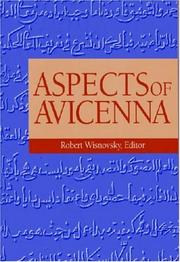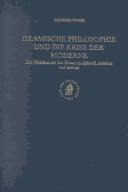| Listing 1 - 3 of 3 |
Sort by
|

ISBN: 1558762515 9781558762510 Year: 2001 Publisher: Princeton (N.J.): Wiener
Abstract | Keywords | Export | Availability | Bookmark
 Loading...
Loading...Choose an application
- Reference Manager
- EndNote
- RefWorks (Direct export to RefWorks)
The philosopher and physician Abū 'Alī ibn ibn Sīnā (d. 1037 c.e.), known in the West by his Latinized name Avicenna, was one of the most influential thinkers of the Islamic and European Middle Ages. Yet for a great number of scholars today Avicenna's thought remains inaccessible. Because he wrote almost all his works in Arabic, Avicenna seems remote to historians of medieval European philosophy who are able to read only the Latin translations of those works. And because he expresses his subtle and complex ideas in the technical terminology of Aristotelianism and Neoplatonism, Avicenna seems remote to Islamicists who have little or no background in the history of ancient and late-antique philosophy. By addressing some of the most fundamental issues in Avicenna's psychology, epistemology, natural philosophy and metaphysics, the contributors to this book hope to make Avicenna's thought more accessible to Latinists and Islamicists alike. After a brief preface, there are sections on Avicenna's theories of intuition and abstraction, and on his ideas about bodies and matter. Also catalogued in this volume for the first time is a large hoard of photostats of Avicenna manuscripts recently uncovered at the American Research Center in Egypt.
Avicenna, --- Al-Hosain ben Abdallah ben Sînâ, Abou Alî --- Avicenna Latinus --- Avicenne --- Avicene --- Ibn Sīnā, al-Husayn ibn 'Abd Allāh --- Al-Hoessein Ibn Abdoellah Ibn Sînâ, Abou Alî --- Avicenna --- Avicenna, - 980-1037.
Book
ISBN: 9041406344 Year: 2001 Publisher: Amsterdam Anthos
Abstract | Keywords | Export | Availability | Bookmark
 Loading...
Loading...Choose an application
- Reference Manager
- EndNote
- RefWorks (Direct export to RefWorks)
297 --- #GGSB: Islam --- #GGSB: Religie (alg. - niet chr.) --- #gsdb3 --- 217 --- Islam --- Islam. Mohammedanisme --- Muhammad --- Religie (alg. - niet chr.) --- Mohammed --- Allah --- Djahilijja --- openbaring --- duivelsverzen --- Hidjra --- Heilige oorlog --- Heilige vrede --- islam --- 11september 2001 --- Amerika --- de islamitische wereld --- geweld --- fanatisme

ISBN: 9004120297 9004453180 Year: 2001 Volume: 43 Publisher: Leiden; Boston : BRILL,
Abstract | Keywords | Export | Availability | Bookmark
 Loading...
Loading...Choose an application
- Reference Manager
- EndNote
- RefWorks (Direct export to RefWorks)
This book fills the gap in the research of Leo Strauss (1899 - 1973) showing the influence of Alfarabi (870 - 950), Avicenna (980 - 1037) and Averroes (1126 - 1198) on his thought. The first part is historically-philologically oriented and contains neglected material where it presents a new approach to Leo Strauss's work. The second part discusses Strauss's reaction towards the crisis of modernity, stimulated by Islamic philosophy, as well as his nomic understanding of religion as the essential features of his political philosophy. Since Alfarabi is the Muslim Philosopher who had the greatest influence on Strauss's thought, his philosophy will also be analysed. This book offers the opportunity to discover an interesting aspect of the encounter of cultures, and contribute to a modern reception of Islamic philosophy.
Philosophy, Islamic --- Arabic philosophy --- Muslim philosophy --- Philosophy, Arab --- Averroes --- Avicenna --- Farabi --- Alpharabius --- Alfarabius --- Abennasar --- Muḥammad ibn Muḥammad al-Fārābī --- Uzluk oğlu Farâbî --- Fārābī, Muḥammad ibn Muḥammad --- Abu Nasr Mukhammad alʹ-Farabi --- Farabi, Abu Nasr Mukhammad --- Abu-Nasr alʹ-Farabi --- Abū Naṣr Fārābī --- Alfarabi --- Alfārābī, Abu Nasr --- Abu Nasr Alfārābī --- Avennasar --- Abu Nasr Forobiĭ --- Форобий, Абу Наср --- Forobiĭ, Abu Nasr --- alʹ-Farabi --- Al-Faraby --- Abu Nasr Muhammet ibn Muhammet ibn Tarhan ibn Uzlug Faraby --- Faraby, Abu Nasr Muhammet ibn Muhammet ibn Tarhan ibn Uzlug --- Abū Naṣr Muḥammad bin Muḥammad bin Ṭarhkhān bin Ūzluġ al-Fārābī --- Fārābī, Abū Naṣr Muḥammad bin Muḥammad bin Ṭarhkhān bin Ūzluġ al --- -Phwarabi, Abu Nassr --- Pharabi --- פאראבי --- أبو نصر الفارابي --- الفارابي --- فارابي --- فرابي --- Al-Hosain ben Abdallah ben Sînâ, Abou Alî --- Avicenna Latinus --- Avicenne --- Avicene --- Ibn Sīnā, al-Husayn ibn 'Abd Allāh --- Al-Hoessein Ibn Abdoellah Ibn Sînâ, Abou Alî --- Ibn Rochd --- Ibn Rušd al-Hafīd --- Ibn Rušd, Abū 'l-Walīd --- Muhammed Ibn Ahmad --- Abū Nasr Muhammed ibn Muhammed ibn Tarhān ibn Uzlag al-Farabi --- Fārābī --- Muhammed Ibn Muhammed (Abu Nasir) al-Farabi --- Islamic philosophy --- Averroës, --- Avicenna, --- Fārābī. --- Abū al-Walīd ibn Rushd, --- Abū al-Walīd Muḥammad ibn Aḥmad ibn Rushd, --- Abū el-Walīd ibn Roshd, --- Abuʼl-Walid Muhammad bin Rusjd, --- Alṿalid ibn Rushd, --- Averroè, --- Averróis, --- Bin Rusjd, Muhammad bin Ahmad, --- Ibn-e-Rushd, --- Ibn-i Rushd, --- Ibn Rashad, --- Ibn Rochd, --- Ibn Roshd, Abū el-Walīd, --- Ibn Roshd, --- Ibn Ruschd, --- Ibn Rušd, --- Ibn Rushd, --- Ibn Rushd al-Ḥafīd, --- Ibn Rushd, Abū al-Walīd, --- Ibn Rushd, Abū al-Walīd Muḥammad ibn Aḥmad, --- Ibn Rushd, Abul Walid Muhammad ibn Ahmad, --- Ibnu Rosjid, --- Ibnu Rusjd, --- ابن رشد، --- Muḥammad ibn Aḥmad ibn Rushd, --- al-Fārābī, Abū-Nasr Muhammad. --- Islamic philosophy. --- Modernity. --- Rezeption.
| Listing 1 - 3 of 3 |
Sort by
|

 Search
Search Feedback
Feedback About
About Help
Help News
News